An indispensable guide on how to write clearly; useful lessons for aspiring solicitors; and a fascinating account of the murder of a George Bernard Shaw devotee. David Pickup chooses his best books of 2018.
This has been a good year for books, whether learned tomes, historical books, romances or whodunnits. There are, however, still some books I yearn to review - how to become a millionaire from legal aid fixed fees, for example.
Clarity for Lawyers: Effective Legal Language (3rd edition)
Mark Adler and Daphne Perry
£34.95, Law Society
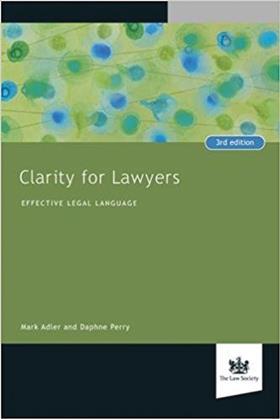
I want to start with Clarity for Lawyers. We all need to be clear. Clarity is important because we need to be understood. Our main role is explaining things to a client and being persuasive. Different skills are needed depending on who we contact. We might write three very different communications about the same event. For example, after a court hearing, letters to the client, the other party or to the court would involve very different styles and vocabulary.
We all need to be concise and avoid stylistic errors such as cliches, which are our bread and butter. There is a temptation perhaps for lawyers to be over-formal and think a four-page letter sent by fax, post and email is better than a one-page email. There is much for all to learn here. I hereby give you notice that there is no real excuse for stuffy or bad language as I have heretofore argued ad infinitum and seriatim. LOL (smiley face)
I have also chosen two books for younger or prospective lawyers. Mainly because we were all young once and most of us are still young at heart! Possibly.
Successful Solicitor: Get Ahead of the Game as a Junior Corporate Lawyer
Katherine Cousins
£10.52, Buggle Publishing
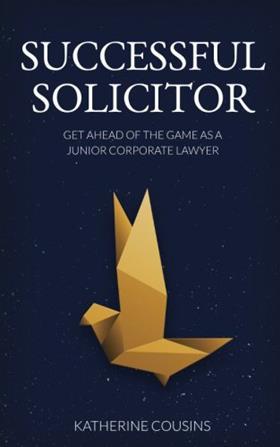
This is a marvellous, witty and sensible book. What advice would you give to your younger self on finishing the training contract? You have been trained at your firm’s expense, possibly opened a few files, seen the odd client, bought 20 Players for your boss numerous times, covered for them when they do not want to speak to a client who phones daily, and learnt when is a bad time to ask them about a problem case. The world is your oyster, the profession owes you a big fat salary and the glamorous life you deserve.
This book is for the newly trained, young solicitor and tells them/you how to get on. It is aimed mainly at the commercial bigshot world most of us dream about.
The advice covers everything from how to shine at interviews, to what to wear at work, and even what to drink and eat. It includes excellent advice: always carry a notebook and a pen, be honest, and always check everything again and again. It includes guidance on the art of door hovering – knocking on the supervisor’s door just about loudly enough for them to hear but not to disturb if they are in a bad mood. A trainee needs to learn not to buttonhole the supervisor the minute they return to the office just as everyone else is leaving to go home. Make them a cup of tea first!
The Complete Guide to Getting a Solicitor’s Training Contract
Sarah Cave
£15, The Choir Press
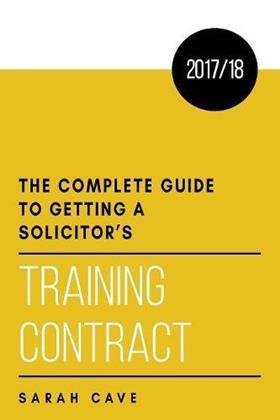
So why do students want to be solicitors? They obviously do, judging by the numbers of applicants for work experience. The standard answers are, ‘I want to help people’ or even worse, ‘I am passionate about human rights.’ I suspect the real answer is, ‘I think it will make me rich’ or ‘I am passionate about being wealthy’. Looking at the table of salaries on page 13 of this book they might be forgiven for thinking this. The typical first-year training salary in London is over £40,000 and on qualification rises to over £60,000. Heartbreaking for the rest of us.
This book covers the basics about the various routes to qualification, how to find out about firms, and preparing for interview and tests. I am obviously doing the wrong thing at interviews as the bigger firms have devised all sorts of different ways to torture applicants.
What is good about this book is that it makes the point that solicitors’ firms - all of them - are businesses. I am glad I do not have to try to get a training contract again.
My next book is a treat.
Blood on the Page. A Murder, a Secret Trial, a Search for the Truth
Thomas Harding
£20, William Heinemann
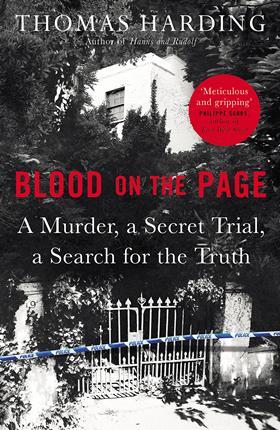
This book is a true-crime story, not a whodunit or detective novel. The description of the background to a violent murder in an upmarket, leafy north London suburb in 2006 is vivid and dramatic. The man arrested for the killing has always protested his innocence and is still in prison. There are several different threads to the tale: the life story of the 86-year-old, reclusive victim; the youth and early life of the accused man in communist China; and the scene of the crime in Hampstead. Each part of that story would make an interesting book in itself. The victim was a published writer and expert on George Bernard Shaw, an interest which took him across the world. He had a lifelong fascination for the playwright, but his career as a biographer was not wholly successful. The alleged killer’s life in China and travel to this country could hardly be more different. The detailed account of his early life is equally intriguing.
These stories are interwoven with an account of the police investigation and the writer’s research into the topic. The book is worth reading solely for the analysis of a modern murder investigation, which included the initial response, a search through piles of rubbish in a near-derelict house, the forensic examination, the work of entomologists and other scientific investigation. All of this is of interest to any criminal practitioner.
What is unique about the trial is that parts were held in secret. Journalists were not only excluded but also prevented from speculating why. This makes the book difficult to write and to review. That aside, it is the fine details that makes the book so compelling. I was intrigued by an aside, which has nothing to do with this story, that prisoners were invited to a comedy workshop in jail which was later cancelled. I wonder why?
The next book is another true case but this time a much older one.
A Victorian Tragedy The Extraordinary case of Banks v Goodfellow
Martyn Frost
£19.99, Wildy, Simmonds & Hill Publishing
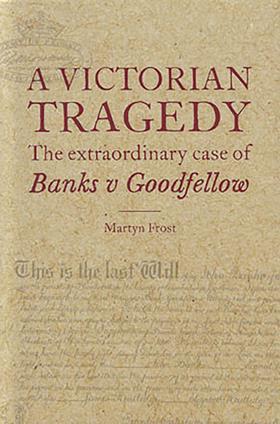
Supposing someone phones your office and asks if you do wills. ‘Yes’, you delightedly reply, and the client explains they want to leave all their money to a member of the royal family or the man in the moon. How do you advise your client about what they can and cannot do, and who decides these questions? Has the client got capacity?
Some of the answers to these questions are set out in the case of Banks v Goodfellow, which forms the basis of this book. That precedent laid out the test of testamentary capacity which, remarkably, has stood for 150 years.
In some ways, this is a typical story of family litigation - involving madness, physical illness and early death. Set in the Lake District town of Keswick 19th century, the case is an interesting account of man with serious and lifelong mental health issues, and how society then dealt with those issues. He looked mad, said a witness, so he must be mad.
Solicitors in Birmingham have been celebrating their 200th birthday this year and they are looking well for their years!
Our Legal Community Two Hundred years of the Birmingham Law Society
Dr Sally Hoban
Birmingham Law Society
This book is a celebration of 200 years of legal history. The standard of production for the volume is excellent, well-illustrated and researched. There are chapters on the society and public life, its links with the local university, the arts and social and sporting life. The chapters on the two world wars are particularly interesting.
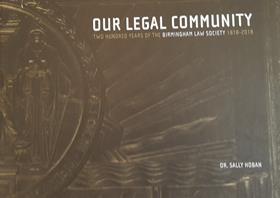
Not surprisingly for an industrial city there is an extensive chapter on technology. It is interesting to reflect on how and when technology has changed our working practices since the 1980s, particularly with mobile phones the size of a house brick, telexes – remember them – and the excitement of getting a fax. (Faxes were printed on shiny paper that faded over time.)
People do not realise how noisy offices were years ago. I remember manual typewriters and then the first electric machines, which had a screen which showed the first line or two before it was typed. Technology has always influenced working life. The first telephone was installed in Birmingham County Court in 1883 and it had its own clerk who was paid £20 to operate it. The chapter on the benefits and failings of technology which keeps us at the beck and call of clients 24/7 should be widely read. They are to be congratulated on a marvellously well-produced book and a very successful 200 years. It is a great encouragement to the whole profession and shows what a local law society can achieve.
- The book costs £20 with packaging and delivery or £15 if collected by hand. The book can be purchased by emailing Birmingham Law Society
My final book is a marvellous set of stories.
Judge Walden - Back in Session
Peter Murphy
£8.99, No Exit Press
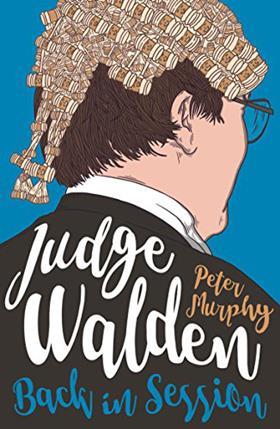
Here are five excellent legal stories about unlikely hero Judge Walden, presiding at Bermondsey Crown Court. They are great fun to read and full of detailed observation on the ups and downs of court life. Our hero’s wife is a vicar and this gives plenty of scope for musing on the similarities between preaching about sin and sentencing sinners.
Judge Walden is the very model of a modern judge, fighting off the ‘grey smoothies’ as the civil service managers are known and dealing with a range of unusual cases. I detect a lighter touch than the previous edition of his stories and there is less about his fellow judges. There is much to enjoy and a story includes entertaining advice about what to do if you dig up a cannon, not to call your vicar as a character witness and what shade of hair dye barristers should or should not use. Each story has a nice twist and keeps you guessing to the end. There is a description of one London criminal clan that has a family Archbold instead of a family bible. He becomes one of the dreaded ‘litigants in person’.
I think there should be prize for excellent legal writing. We have prizes for other types of excellence so why not the legal author? All these books make ideal presents for your colleague, the student who wants a training contract or, above all, for you.
David Pickup is a partner at Pickup & Scott Solicitors, Aylesbury
- Would you be interested in writing a book review for the Law Society Gazette? The Gazette receives books on a range range of legal specialisms, as well as fiction, history and biography. If you are interested please email Nicholas Goodman indicating your specialism.
































No comments yet